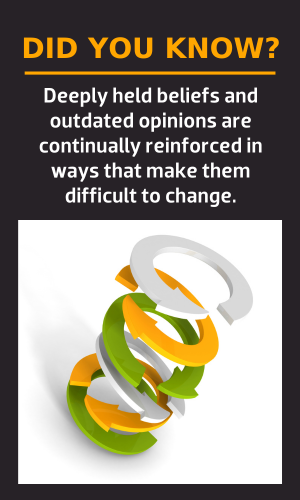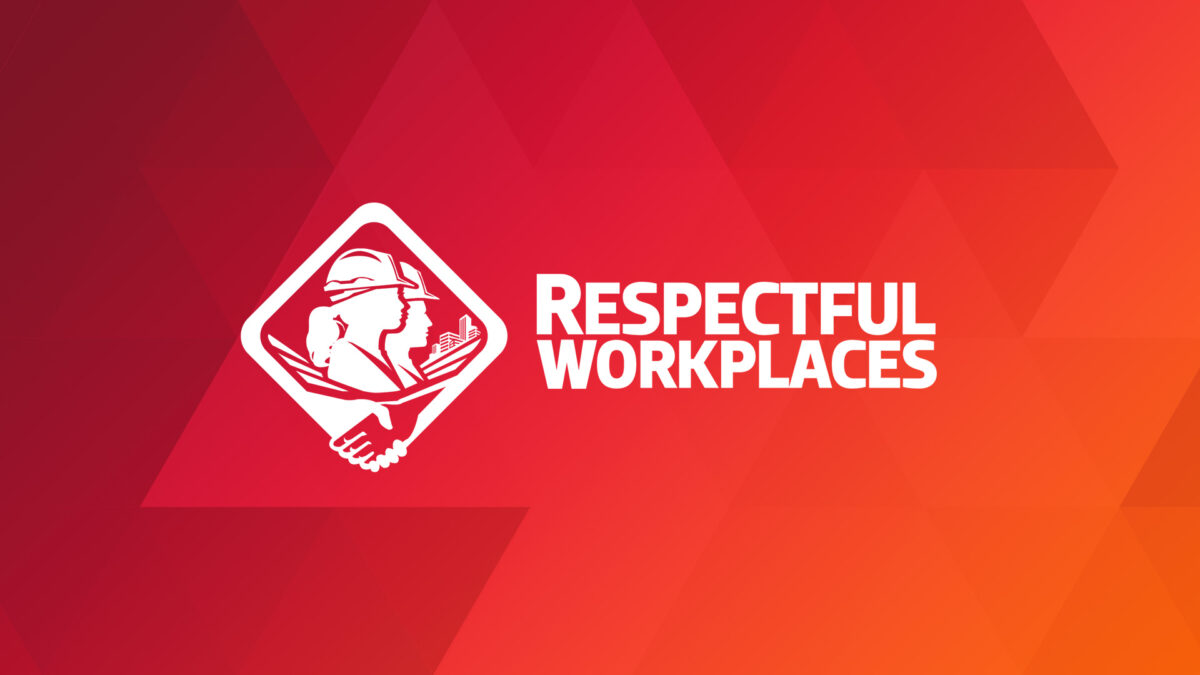Does your organization encourage leaders to rethink decisions about people and systems?

The Canadian construction industry is facing an unprecedented labour shortage. As of July 2022, the number of job vacancies in the industry has never been higher, and will place additional pressures on the industry for years to come as the retirement of older workers continues throughout the decade.
In order to meet this challenge, the Canadian construction industry will need to create inclusive workplaces in order to attract and retain the younger workers it needs. Research shows that they expect organizations to be inclusive and welcoming of workers from traditionally under-represented groups, such as women; members of Black, Indigenous, and People of Colour communities; LGBTQ2S+ workers; and newcomers.
However, the shift to an inclusive organization is challenging because it requires rethinking our deeply held beliefs and outdated opinions such as bias and stereotypes. According to Adam Grant, an organizational psychologist at the Wharton School of the University of Pennsylvania, this is difficult because we don’t just hesitate to rethink our opinions: we hesitate at the very idea of rethinking them. And often, the more successful we are, the more trouble we have. (See blog #73 for an in-depth discussion about our inability to “rethink” our opinions.)
Readers will recall that we begin developing bias and stereotypes early in our lives and they are continually reinforced in ways that make them difficult to change. And unfortunately, these biases and stereotypes are often unconscious, impacting our decision making despite our best intentions.
Research shows that our biases about people can unintentionally get built into the systems we develop, such as recruitment and promotion, resulting in system-wide or systemic bias. Without efforts to improve the quality of decisions by rethinking our deeply held beliefs and outdated opinions, organizations will have difficulty creating inclusive and welcoming workplaces.
Because of their power to influence their organizations, it is impossible to overestimate the benefit of leaders who are in the habit of rethinking their decisions about people and systems.
Dr. Grant’s research has identified nine habits that can help us to rethink our decisions.
1. Think like a scientist. Research shows that the human mind fights to hold on to its deeply held beliefs like bias and stereotypes. These automatic responses prevent us from seeking the truth. Instead, Dr. Grant urges people to get into the habit of thinking like a scientist when making decisions.
Based on research that shows that when entrepreneurs think like scientists, their businesses are more successful, he urges people to think of any strategy or idea as a theory, develop hypotheses, and approach the proposed solutions as experiments.
2. Embrace the joy of being wrong. Some people are actually thrilled when they find out their beliefs are wrong. Good Judgement, the international forecasting services firm, hosts forecasting tournaments in which people try to predict the outcomes of specific events, such as the winner of the next soccer World Cup.
The most important driver of forecasters’ success was how often they updated their predictions. The best forecasters updated their predictions more than four times per question.
3. Define your identity in terms of your values, not your opinions. Who you are should be a question of what you value, not what you believe. To unlock the joy of being wrong, we need to detach from our opinions.
Attachment to our opinions keeps us from rethinking them. To keep our mind open to new beliefs, we may define ourselves in terms of core values such as curiosity, learning, or the search for knowledge.
4. Seek out information that contradicts your views. There are at least two biases that drive us to reject contradictory evidence. Confirmation bias causes us to see what we expect to see, and desirability bias causes us to see what we want to see.
You can fight confirmation bias and desirability bias by actively engaging with ideas that challenge your assumptions. An easy place to start is to follow people who make you think, even if you usually disagree with them.
5. Don’t confuse confidence with competence. Research shows that when we are the most confident is when we are most likely to lack competence. Psychologists David Dunning and Justin Kruger found that people who scored the lowest on tests of logical reasoning, grammar, and sense of humour, had the most inflated opinions of their skills. On average, they believed they did better than 62 percent of their peers, but in reality, outperformed only 12 percent of them.
This tendency matters because over-confidence compromises self-awareness. If we’re certain that we know something, we have no reason to look for gaps and flaws in our knowledge, let alone fill or correct them.
6. Harness the benefits of doubt. The opposite of over-confidence is the imposter syndrome in which competence exceeds confidence. The balance between the two extremes is confident humility: you are confident in your capability, while appreciating that you may not be addressing the right problem or solution.
The key is to reframe the situation as an opportunity for growth: have enough doubt that causes you to reexamine your knowledge and enough confidence to pursue new insights.
7. Learn something new from each person you meet. The process of rethinking often unfolds in a cycle. It starts with intellectual humility: knowing what we don’t know. As we question our current understanding, we become curious about what information we’re missing. That search leads us to new discoveries, which in turn maintains our humility.
Everyone knows more than you about something. Ask people what they’ve been rethinking lately, or start a conversation about times that you’ve changed your mind in the past year.
8. Build a challenge network, not just a support network. Agreeable people make a great support network. However, rethinking depends on a challenge network: a group of people we trust to point out our blind spots and push us to be humble about our expertise and curious about new perspectives.
9. Don’t shy away from constructive conflict. Experiments show that it’s more productive to frame a disagreement as a debate. This signals that you’re receptive to considering dissenting opinions and changing your mind, which in turn motivates the other person to share more information with you.
In order to meet the challenge of an unprecedented labour shortage, construction organizations must be inclusive and welcoming of workers from traditionally under-represented groups. However, this is challenging because it requires leaders to rethink deeply held beliefs about people and systems. Because of their power to influence their organizations, it is critical that organizations encourage leaders to get into the habit of rethinking their decisions.
Leaders and managers who want to understand how bias and stereotypes can impact decisions about people and systems may wish to participate in the Introduction to Understanding Systemic Racism: A Guide for Leaders and Managers online course. This course helps learners to understand how bias and stereotypes are formed in our minds and how they impact systems such as recruitment and promotion.
Resources
- BuildForce Canada Magazine. “Toward Net Zero.” Canada, Matrix Group Publishing Inc., 2022. See page 9.
- Deloitte. Deloitte Global 2021 Millennial and Gen Z Survey. See www.deloitte.com/global/en/issues/work/genzmillennialsurvey.html.
- Grant, Adam. Think Again: The Power of Knowing What You Don’t Know. New York, New York. Viking 2021.
Read from the beginning. Click here to start at Part 1.
What can an effective Respectful and Inclusive Workplace Program deliver?
- Become an employer of choice – attract, retain, and advance top talent from all sources of labour
- Unlock collaboration and innovation – create high-performing teams through diversity of thought and experience
- Build your brand – your organization will gain a competitive edge as a leader and innovator
Get started today!
The BuildForce Canada Online Respectful and Inclusive Workplace Toolkit includes:
- the Respectful Workplace Online Self-Assessment Tool to assist organization leadership in assessing their current situation and identifying where they may need to make changes
- the Respectful Workplace Policy Framework and Implementation Guide to assist organizations in creating and implementing a policy that supports a respectful and inclusive workplace
- the Respectful Workplace Online Training Course to train workers on how to create and support a respectful and inclusive workplace
- the online course Introduction to Understanding Systemic Racism: A Guide for Leaders and Managers
All the resources you need to create and support a respectful and inclusive workplace!

Respectful and Inclusive Workplaces
